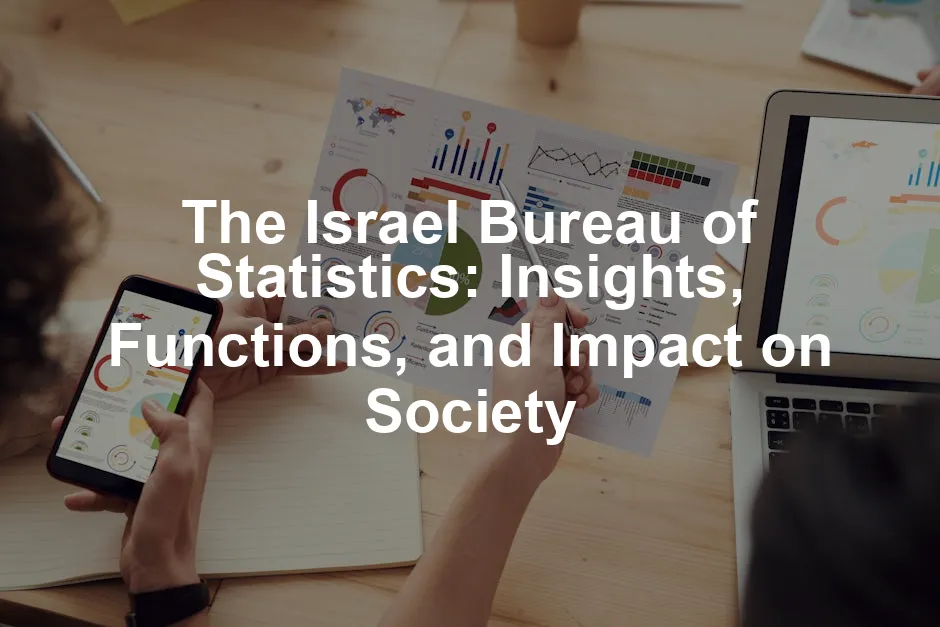Introduction
Statistics are the lifeblood of effective governance. Enter the Israel Bureau of Statistics (CBS), an essential arm of the Israeli government. Established in 1949, CBS provides a treasure trove of data that influences decision-making across various sectors. From economic indicators to demographic trends, CBS plays a crucial role in shaping policies and strategies aimed at improving citizens’ lives.
This article aims to shed light on CBS’s history, structure, and functions. We will also examine recent data trends that reveal much about Israeli society. By understanding the CBS’s role, we can appreciate how statistics empower the government to make informed decisions.
Why are statistics so vital for governance? Well, think of it this way: without solid data, policymakers are like a ship sailing without a compass. Statistical data helps guide decisions on resource allocation, social welfare programs, and economic development. It ensures that policies are not just shot in the dark but are based on factual insights. As society changes, so too must the data that informs governance, making the CBS’s work not just relevant but indispensable.
The CBS collects, analyzes, and disseminates data on a range of topics, including population dynamics, health, and education. In a world where information is power, the CBS stands as a beacon of knowledge. Join us as we explore the history of this vital institution and how it has evolved to meet the needs of a changing society. Let’s dive into the fascinating world of numbers and see how they impact our everyday lives.

For those interested in a comprehensive overview of Israeli statistics, the Statistical Abstract of Israel is an essential read. It compiles key statistics across multiple sectors, making it an invaluable resource for anyone looking to understand the data landscape in Israel.
History of the Israel Bureau of Statistics
Establishment and Early Years
The Israel Bureau of Statistics (CBS) was born in 1949, just after the establishment of the State of Israel. Its primary objective? To collect and publish statistical data that would inform government policies and societal needs. In its early days, CBS focused on gathering essential information about the population, economy, and infrastructure.
One of the bureau’s key milestones was the first national census conducted in 1949. This census laid the groundwork for understanding the demographic makeup of the new nation. It was a monumental task, considering the diverse backgrounds and experiences of the Israeli population.
Over the years, CBS has undergone significant transformations. Initially, its focus was narrow, primarily dealing with population statistics. However, as the nation grew and evolved, so did the bureau’s responsibilities. It expanded its scope to include a variety of vital data, from economic indicators to social trends. This evolution reflects the changing needs of Israeli society, demonstrating CBS’s adaptability and commitment to providing relevant information.
In a nutshell, the CBS’s journey from its humble beginnings to a comprehensive statistical powerhouse underscores its significance in the fabric of Israeli governance. This institution not only tracks numbers but also tells the story of a nation in motion. The next sections will further explore how the bureau’s structure and functions have evolved to meet these challenges.

Evolution Over the Decades
Changes in Structure and Leadership
The Central Bureau of Statistics (CBS) has experienced notable changes since its inception in 1949. Initially, the organization was quite small, primarily focused on basic population data. Over the decades, it has transformed into a robust institution tasked with a broader array of responsibilities.
Key figures have shaped the bureau’s journey. A significant figure is Professor Emeritus Danny Pfefferman, who has been the National Statistician since 2013. Under his leadership, the CBS has embraced modern statistical practices and emphasized transparency. The governance structure has also evolved, with the National Statistician now reporting directly to the Prime Minister, showcasing the importance of statistical data in shaping national policies.
The Public Commission of Statistics oversees the CBS, ensuring that its operations align with international standards. This oversight helps maintain the integrity and accuracy of the data produced, solidifying the bureau’s reputation as a reliable source of information.

Expansion of Responsibilities
The CBS’s responsibilities have expanded significantly over the decades. Initially focused on demographic and economic data, it now covers a wide range of statistical domains. These include health, education, industry, and social welfare, making the CBS essential for comprehensive national planning.
The introduction of periodic surveys and the decennial Census of Population and Housing are just a few examples of how the bureau has diversified its data collection efforts. This expansion reflects the changing needs of Israeli society. As the population grows and evolves, so does the demand for accurate and timely data.
The CBS has also adapted to technological advancements, employing modern data collection methods and analytical tools. This evolution not only enhances data accuracy but also improves accessibility for researchers, policymakers, and the public. The bureau’s ability to provide nuanced insights into various sectors underscores its critical role in supporting informed decision-making across all levels of government.

Functions of the Israel Bureau of Statistics
Data Collection and Research
The Central Bureau of Statistics (CBS) is Israel’s data powerhouse. It collects a wide range of information that shapes government policy and public understanding. The types of data gathered by the CBS can be grouped into several key categories.
First, there’s population data. This includes demographics like age, gender, and family size. It’s crucial for understanding societal changes and planning for future needs. Then, we have economic data. This encompasses everything from national GDP to household expenditures. For businesses and policymakers, this information is gold.
Health statistics are another vital category. CBS tracks various health indicators, including life expectancy and prevalent diseases. This data helps inform public health initiatives and resource allocation. Education data is also collected, covering everything from enrollment figures to academic performance. This information is essential for improving the education system and ensuring equal opportunities for all. For a deeper understanding of health statistics in Israel, consider checking out the book Health Statistics in Israel. It dives deep into the health trends that matter.

Understanding health statistics is crucial for public health initiatives. Learn more about the role of Stephen J. Blumberg and the National Center for Health Statistics.
One of the most significant events in the CBS’s calendar is the Census of Population and Housing, conducted every ten years. This comprehensive undertaking is not just a headcount; it’s a detailed examination of the country’s demographics. The methodology involves rigorous data collection techniques, including surveys and administrative records.

The significance of the decennial census cannot be overstated. It provides a snapshot of the nation, helping to identify trends and shifts in the population. The results inform everything from infrastructure development to social services planning, making it a cornerstone of effective governance. If you’re interested in the broader context of Israel’s demographic trends, you might find Demographic Trends in Israel insightful.
Dissemination of Information
Once data is collected, the CBS has the important task of disseminating it. The bureau publishes a variety of reports that are essential for transparency and public knowledge. One of the most well-known publications is the Statistical Abstract of Israel. This annual report is a comprehensive compilation of key statistics across multiple sectors. It’s like the Bible of Israeli statistics!
In addition to the Statistical Abstract, the CBS releases monthly and quarterly reports that keep the public updated on economic and demographic trends. These reports are crucial for researchers, journalists, and anyone interested in understanding current events in Israel.

Accessibility is another key focus for the CBS. Data is made available through various channels, including its official website. Here, the public can access a wealth of information, from raw data sets to insightful analyses. The CBS also ensures that its data reaches academic institutions and government entities, supporting informed decision-making across the board.
Moreover, the CBS employs modern technology to enhance data accessibility. Interactive databases and online tools allow users to explore data in a user-friendly manner. This commitment to accessibility empowers citizens, researchers, and policymakers to engage with the data and use it effectively.

In summary, the CBS plays a vital role in both collecting and disseminating data. Through its comprehensive reports and user-friendly access points, it ensures that essential information reaches those who need it most. Whether it’s shaping policy or informing public debate, the CBS’s data is invaluable in understanding the complexities of Israeli society. If you’re curious about the broader economic indicators in Israel, consider reading Economic Indicators of Israel.
Coordination with Other Agencies
Collaboration with Government Ministries
The Central Bureau of Statistics (CBS) is a busy bee buzzing around various government ministries. Its role? Providing vital statistical data that supports decision-making in diverse fields like health, education, and infrastructure. Think of the CBS as the data whisperer, ensuring that ministries are well-equipped with accurate numbers to craft effective policies.
For instance, when the Ministry of Health needs to assess healthcare outcomes, the CBS delivers population health statistics. The Ministry of Education relies on CBS data to evaluate student performance and resource allocation. This collaboration ensures that each ministry can make decisions backed by reliable information, resulting in more effective governance.

Moreover, the CBS produces regular reports tailored to the needs of different ministries. These reports feature economic indicators, demographic shifts, and even insights into social trends. This streamlined communication ensures that ministries receive timely data, keeping them informed and ready to tackle pressing issues.
International Relations
The CBS also has its eyes set beyond Israel’s borders. It collaborates with international statistical organizations, enhancing its data credibility and fostering knowledge exchange. These partnerships allow the CBS to align its methodologies with global standards, ensuring that its statistics are comparable on an international scale.
One notable collaboration is with the United Nations’ statistical divisions. This partnership helps the CBS contribute to global statistical initiatives, sharing data that reflects Israel’s social and economic landscape. By working alongside international bodies, the CBS not only boosts its own expertise but also plays a role in shaping global statistical practices. If you want to understand the political aspects of statistics, consider checking out The Politics of Statistics.

In a world where data is king, these international relationships help the CBS stay ahead of the curve, ensuring that its insights are both relevant and impactful on a global stage.
Recent Data Trends and Analyses
Economic Indicators
GDP Growth and Economic Performance
Israel’s economy has shown remarkable resilience in recent years. Despite global challenges, the GDP has been on an upward trajectory. Recent data indicates that Israel’s GDP growth rate hovers around 3.3% in 2023, showcasing a robust recovery post-pandemic.
Key sectors driving this growth include technology and services. The tech industry, often dubbed the “Startup Nation,” continues to attract significant investments. Major tech companies are setting up shop in Israel, contributing to job creation and economic dynamism.

However, challenges remain. The ongoing geopolitical tensions have introduced uncertainties. Despite these hurdles, the overall economic performance reflects a commitment to innovation and adaptability. Policymakers leverage this data to strategize and bolster economic stability, ensuring that Israel remains competitive on the global stage.
Unemployment and Job Market Statistics
Unemployment rates have shown a promising decline, with current figures at approximately 3.4%. This is a significant drop from the peaks experienced during the pandemic. The job market is witnessing a surge in demand, particularly in sectors like technology, healthcare, and engineering.
Labor force participation is also on the rise, with more individuals seeking employment. This increase is fueled by various factors, including government initiatives aimed at enhancing workforce skills and encouraging diversity in the labor market. The CBS’s data highlights these trends, empowering the government to make informed decisions regarding labor policies and training programs. For insights into why unemployment statistics can sometimes be unreliable, see our article here.

Understanding the reliability of unemployment statistics is crucial for effective labor policies. Explore the reasons behind the unreliability of unemployment statistics.
However, it’s not all rainbows and sunshine. The job market faces challenges, particularly for marginalized groups. Addressing these disparities is crucial for ensuring inclusive growth, and the CBS’s insights play a pivotal role in shaping interventions aimed at fostering equality in employment opportunities.

Demographic Changes
Population Growth
Israel’s population is on a steady rise, projected to surpass 10 million within the next few years. Recent statistics reveal a current population of around 9.4 million, with growth driven by both natural increase and immigration.
Factors influencing this growth include a relatively high birth rate, especially among certain communities. Additionally, Israel remains a popular destination for immigrants, drawn by its economic opportunities and robust social services.

The CBS provides essential data that helps policymakers understand demographic shifts. This understanding is crucial for planning infrastructure, healthcare, and education. As the population grows, so does the need for effective policies that cater to diverse communities and their unique needs. If you’re intrigued by the historical context of these trends, The History of Israel: From the Rise of Zionism to Our Time offers a deep dive into the events that shaped the nation.
Migration Trends
Migration patterns have also been dynamic, with recent data indicating fluctuations in immigration rates. After a surge following significant geopolitical events, there has been a stabilization in migration.
The CBS tracks these trends meticulously, providing insights that inform policy decisions regarding immigration and integration. Understanding the factors behind these shifts aids in crafting welcoming policies that support newcomers while addressing the concerns of existing residents.

Social Indicators
Health and Education Statistics
Health and education are two pillars of any society, and the CBS doesn’t hold back on sharing vital statistics. Recent reports reveal that life expectancy in Israel has reached a remarkable 84.6 years for females and 80.5 years for males. This places Israel among the top countries globally in terms of health outcomes.
In education, the CBS highlights a significant increase in higher education enrollment, with over 50% of eligible students pursuing degrees. However, challenges remain, particularly in equal access and performance disparities among different population segments. For those curious about the social dynamics, the book Israel’s Social Indicators provides an in-depth analysis.
Social Inequality and Poverty Statistics
Ah, social inequality—an age-old issue that continues to plague societies worldwide! The CBS data highlights a concerning reality in Israel. Approximately 20% of the population lives below the poverty line. This stark statistic points to the disparities between different socio-economic groups, often correlating with ethnicity and geographic location.
The reports show that while some communities thrive, others struggle with access to essential services such as healthcare and education. This uneven distribution of resources fuels ongoing debates about social policy and economic equity. The CBS’s insights are vital for shaping strategies that address these pressing inequalities, ensuring a fairer society for all. If you’re interested in the socio-economic aspects, the book The Israeli Economy: Trends and Challenges is a great resource.
Please let us know what you think about our content by leaving a comment down below!
Thank you for reading till here 🙂
All images from Pexels




